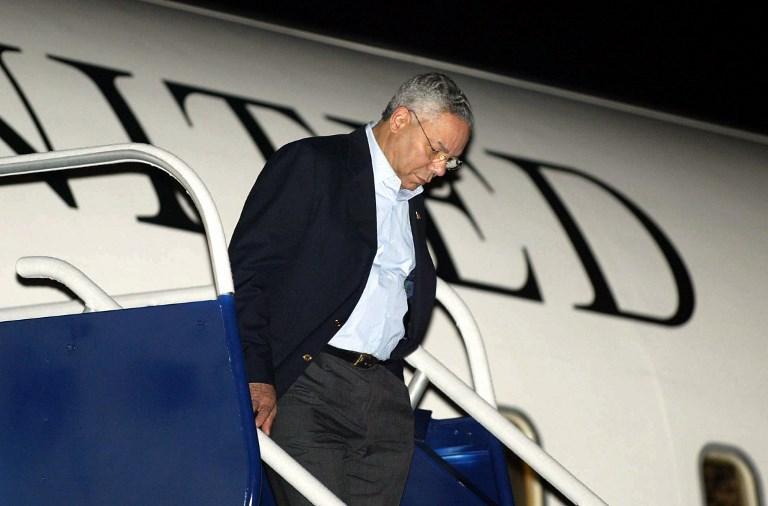LE LEADERSHIP AMÉRICAIN DANS LE MONDE EST REMIS EN CAUSE PAR DONALD TRUMP
EXCLUSIF SENEPLUS - Dans un article à paraître demain dans le New York Times, Colin Powelll dénonce la décision de Donald Trump de couper de 30% le budget du ministère des Affaires étrangères américain

SeenePlus a obtenu en exclusivité pour ses lecteurs sénégalais et amis du Sénégal, une contribution de l'ancien Secrétaire d'Etat américain le général Colin Powell à paraître demain dans le New York Times. Dans cet article que nous vous proposons dans sa version originale en anglais, Colin Powell considère que le leadership américain dans le monde "ne peut pas être gratuit". Il s'en prend ainsi à la décision du président Donald Trump de couper 30% du budget du ministère américains des Affaires étrangères.
At our best, being a great nation has always meant a commitment to building a better, safer world – not just for ourselves, but for our children and grandchildren. This has meant leading the world in advancing the cause of peace, responding when disease and disaster strike, lifting millions out of poverty and inspiring those yearning for freedom.
This calling is under threat.
The administration’s proposal, announced Tuesday, to slash approximately 30 percent from the State Department and foreign assistance budget signals an American retreat, leaving a vacuum that would make us far less safe and prosperous. While it may sound penny-wise, it is pound-foolish.
This proposal would bring resources for our civilian forces to a third of what we spent at the height of Ronald Reagan’s “peace through strength” years, as a percentage of the gross domestic product. It would be internationally irresponsible, distressing our friends, encouraging our enemies and undermining our own economic and national security interests.
The idea that putting Americans “first” requires a withdrawal from the world is simply wrongheaded, because a retreat would achieve exactly the opposite for our citizens. I learned that lesson the hard way when I became secretary of state after a decade of budget cuts that hollowed out our civilian foreign policy tools.
Many had assumed the Cold War’s end would allow us to retreat from the world, but cuts that may have looked logical at the time came back to haunt us as tensions rose in the Middle East, Africa, the Korean Peninsula and elsewhere. Confronting such challenges requires not just a military that is second to none, but also well-resourced, effective and empowered diplomats and aid workers.
Indeed, we’re strongest when the face of America isn’t only a soldier carrying a gun but also a diplomat negotiating peace, a Peace Corps volunteer bringing clean water to a village or a relief worker stepping off a cargo plane as floodwaters rise. While I am all for reviewing, reforming and strengthening the State Department and the United States Agency for International Development, proposals to zero out economic and development assistance in more than 35 countries would effectively lower our flag at our outposts around the world and make us far less safe.
Today, the world is witnessing some of the most significant humanitarian crises in living memory. With more than 65 million people displaced, there have never been more people fleeing war and instability since World War II. The famines engulfing families in South Sudan, Yemen, Nigeria and Somalia put more than 20 million people at risk of starvation – further destabilizing regions already under threat from the Islamic State, Al Qaeda, Boko Haram and Al-Shabaab.
Do we really want to slash the State Department and the U.S.A.I.D. at such a perilous moment? The American answer has always been no. Yet this budget proposal has forced us to ask what America’s role in the world is and what kind of nation we seek to be. The president’s budget director, Mick Mulvaney, has described these cuts as “not a reflection of the president’s policies regarding an attitude toward State.” But how is a 32 percent cut to our civilian programs overseas anything but a clear expression of policy?
True, many in Congress have effectively declared the administration’s budget proposal “dead on arrival,” but they also acknowledge that it will set the tone for the coming budget debate. That’s the wrong conversation. Our diplomacy and development budget is not just about reducing spending and finding efficiencies. We need a frank conversation about what we stand for as that “shining city on a hill.” And that conversation begins by acknowledging that we can’t do it on the cheap.
Diplomacy and aid aren’t the only self-defeating cuts in the administration’s proposal. A call to all but eliminate two key export-promotion agencies – the Overseas Private Investment Corporation and the Trade and Development Agency – would harm thousands of American workers and actually add to the deficit. And any cuts to our economic development investments in Africa and elsewhere would undermine our ability to build new customer bases in the world’s fastest-growing markets.
With 95 percent of the world’s consumers outside our borders, it’s not “America first” to surrender the field to an ambitious China rapidly expanding its influence, building highways and railroads across Africa and Asia. China is far from slashing its development budget. Instead, it’s growing – by more than 780 percent in Africa alone since 2003.
Since the release of its initial budget request in March, the administration has started to demonstrate a more strategic foreign policy approach. This is welcome, but it will take far more than a strike against Syria, a harder line on Russia, increased pressure on North Korea and deeper engagement with China to steer American foreign policy. It also takes the resources to underwrite it.
America is great when we’re the country that the world admires, a beacon of hope and a principled people who are generous, fair and caring. That’s the American way. If we’re still that nation, then we must continue to devote this small but strategic 1 percent of our federal budget to this mission.
Throughout my career, I learned plenty about war on the battlefield, but I learned even more about the importance of finding peace. And that is what the State Department and U.S.A.I.D. do: prevent the wars that we can avoid, so that we fight only the ones we must. For our service members and citizens, it’s an investment we must make.
Colin Powell was the US Secretary of State from 2001 to 2005













